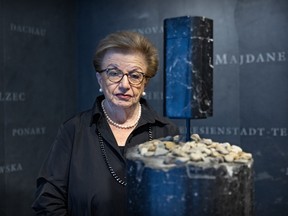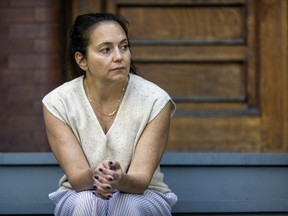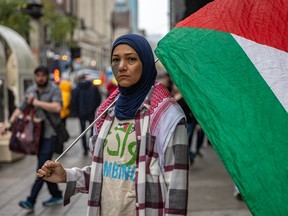Ensuing protests and violence against Jewish places have deepened the sense of isolation for many.

Article content
For many in Montreal’s Jewish community, the horror of the Israel-Hamas war has been compounded by the fact most never got the chance to fully grieve the massacre that sparked it.
“October 7th, for most of us, was the greatest tragedy in our lived Jewish experience,” said Rabbi Lisa Grushcow of the Temple Emanu-El-Beth Sholom in Westmount. An estimated 1,200 people were killed, most of them civilians, and 250 hostages seized when Hamas terrorists invaded. Hundreds were killed at kibbutz communities, small villages and at a music festival.
Advertisement 2
Story continues below
Article content
“Most of us have ties to Israel in some way, be it family or friends or other connections,” Grushcow said. “So the absolute tragedy and trauma and horror of that day is still very fresh in people’s minds.”
But as Israel retaliated, images of the largest killing of Jews in one day since the Holocaust were quickly supplanted by footage of the bombardment of Gaza.
“I think that empathy and compassion for the basic horror of that day disappeared very quickly,” Grushcow said.
At the same time, antisemitic acts and attacks increased worldwide. In Montreal, where Jewish schools have been shot at and synagogues hit with Molotov cocktails, Jews have felt targeted for their religion based on a war 9,000 kilometres away, while at the same time abandoned by their own country. It has led to a greater sense of isolation for many.
“It’s been deeply disappointing for many of us who are Canadian born and raised that there has been, at best, silence from many of the people who we would imagine would check in, or just have those basic gestures of shared humanity,” Grushcow said. Politicians have been citing platitudes but not taking action, “and there seems to be an acceptance of that in the broader society.”
Advertisement 3
Story continues below
Article content
The length and growing breadth of the conflict, which Gaza’s Health Ministry says has taken more than 41,000 lives in the Gaza Strip, is another source of sadness and fear.
“I never ever would have thought last October that we would still have posters of 100 hostages in our sanctuary who are still in Gaza, dead or alive,” she said.
Gruschcow stresses many Montrealers have been supportive, but it’s often the vocal minority who stand out. University campuses have long been home to Israel-Palestinian protests, “but there is an extremism to this that’s very different than my experience being on campus 25 years ago, when people actually would talk to each other.
“What I think is part of the real tragedy of this is that none of that antisemitism improves the position of Palestinians. All it’s doing is making things worse here, where we ought to have a better chance of finding ways to be good neighbours.”

For Holocaust survivor Rachel Gropper, the violence perpetrated on Oct. 7 “prompted in me nightmares and dreams that I haven’t had in a very long time.”
When Germany invaded Poland, her family fled to the Soviet Union and were forced to work in gulags alongside hundreds of thousands of Polish Jews, toiling in coal mines in Siberia and wheat fields in Uzbekistan. After the war, the family found a home in Montreal.
Article content
Advertisement 4
Story continues below
Article content
Gropper worked her whole life as a teacher and principal, and has for years given talks to students and adults on the horrors of the Holocaust. She was recently named co-president of the Montreal Holocaust Museum. Education, she says, and the experiences gleaned from surviving and speaking about the Holocaust, have been her weapon of choice her whole life, and informs everything she does. So the uniformed and polarized attitudes exhibited by many here have been the most disturbing aspect for her.
“It has exposed in a large way that many of the people who yell and scream and proselytize don’t know the context, don’t know what they’re talking about,” she said. “And here it is again on my doorstep — this virulent, horrible centuries-old plague.”
The vitriol is in stark contrast to her many conversations with students of different faiths, which have been respectful and open.
“I don’t expect people to agree with me, but I do want them to be able to dialogue with me without wanting to trample me, or use any kind of stereotypical antisemitic tropes against me.”
The venom spewed runs counter to the mandate of the Holocaust Museum, whose raison d’être “is to teach people not to hate.”
Advertisement 5
Story continues below
Article content

Andrea Borod is the granddaughter of Holocaust survivors, and has many family members in Israel. She has always considered herself a Liberal Jew, sympathetic to the plight of Palestinians.
But the events of Oct. 7 and the ensuing protests and acts of violence in Montreal have left her deeply troubled. The mother of a 9-year-old daughter, she was scared to sleep alone at home for three months after the Oct. 7 attacks. They didn’t open their door to Halloween trick-or-treaters last year.
“To this day, I look at my daughter sometimes and I think of what they did to those children. I think: ‘It could have been us.’”
She’s finding a lot of the dialogue at protests and on social media disturbing, tainted by subverted ideology and the type of propaganda spouted for decades justifying hatred against Jews.
“It’s thoughts that I never thought as a Canadian Jew I would ever feel, and it’s here with us all the time. It’s like we’re constantly looking over our shoulder and it feels really disappointing that more people haven’t stood up to denounce antisemitism because they’re so afraid of being labeled Zionists.”
Advertisement 6
Story continues below
Article content
Her disappointment extends to Prime Minister Justin Trudeau, who she said has failed to support the Jewish community. She doesn’t intend to vote for him in the next federal election.
What’s most hurtful for her, she said, is that the fear and disillusionment is eroding her natural compassion.
“At this point, I don’t feel we’ve been shown much empathy,” she said. “So what hurts me as a liberal Jew is that my empathy is going down for anyone but my community, because I’m going to think of my community now.”
Allison, a PhD student at McGill University, has close ties to Israel. Her mother’s family lives in the south, and she has travelled there several times. One of her best friends lives in Sderot, one of the towns targeted by Hamas. They spoke by phone on the day of the attack. Her friend said it was quiet, but she didn’t know if that was because Hamas had won, or the Israeli defence forces had. They waited on the line together.
On an earlier trip to Israel, she and her sister stayed in one of the kibbutzes that would be attacked years later. All but two of the members of the home-stay family her sister had lived with were killed.
Advertisement 7
Story continues below
Article content
“It all feels very close, and personal,” she said. She has a minor in Arabic studies, and is sympathetic to the Palestinian cause. But with protesters blocking her from going to classes, spouting anti-Zionism that sounds much like antisemitism, it has felt like “a long year trying to find a truth in a situation that has so many truths,” she said. For her, it called to mind the Jewish experience that brings fear of the unknown, generation after generation. “People treat it like it’s normal, and it’s not normal. We thought we were okay, and then out of nowhere the attacks started happening.” She asked that her real name not be used for fear of reprisals.
Her mother was forced to flee Iran because of antisemitic persecution. “Be careful who you tell you’re a Jew,” her mother would warn her. “People think Jews living here are far removed from that kind of antisemitism. But we’re not.”
Being a Liberal Jew in Montreal is difficult, she said, because you’re not pro-Israel enough for mainstream Jews, and not pro-Palestinian enough for more liberal Jews.
“All these different ideologies make it complex, and you just feel out of place everywhere. … The people who are closer to the conflict understand there is more nuance to every situation.”
Still, even as the war continues and expands, she finds reason for hope.
At a synagogue class, one young student asked her: “Why do they hate us so much?”
“And I immediately said ‘Not all of them do. It’s complicated, and not everyone is inherently antisemitic.
“‘There’s a lot of hatred in the world, but not everyone is part of that.’”

October 7, One Year Later: For local Palestinians, ‘nothing makes sense anymore’
Recommended from Editorial
Advertisement 8
Story continues below
Article content
Article content


Comments